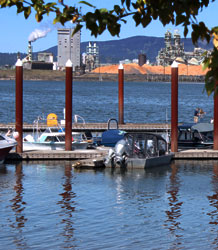
Gene Autry “the Singing Cowboy,” on Champion, and no doubt glad to be “back in the saddle…”
* * * *
In case you hadn’t noticed, I’m back in the saddle after three weeks out of town. (Part of that time was spent on the Columbia River, near Astoria, on unfinished canoe-trip business, as noted in On the OTHER readings for August.) I left town on Monday August 10, and got back August 27.
My last post featured an analysis of the Sunday Bible readings for August 16, 23 and 30. This post will feature highlights from the Daily Office Readings that I read, all during my three-week hiatus away from home and the daily routine.
To begin with, the main readings for August 10 – the day I flew out west – were 2 Samuel 13:23-39, Acts 20:17-38, and Mark 9:42-50. The first (OT) reading had David’s son Absalom fleeing, after killing his brother Amnon, for raping his half-sister Tamar. (She was Absalom’s “full sister.”) That all led to Absalom’s attempted coup d’état, discussed in On the readings for August 9. (Where he ended up literally “hanging from a tree.”) In the second reading, Paul took a tearful departure from Miletus, after his “last visit to Jerusalem and arrest:”
When he had finished speaking, he knelt down with them all and prayed. 37There was much weeping among them all; they embraced Paul and kissed him, 38grieving especially because of what he had said, that they would not see him again.
In the Gospel, Jesus discussed stumbling blocks, and how we should avoid them.
 The readings for August 15 – the day that my brother and I launched our canoe from Rainier, Oregon (as shown at left) – were 2 Samuel 16:1-23, Acts 22:17-29, and Mark 11:1-11.
The readings for August 15 – the day that my brother and I launched our canoe from Rainier, Oregon (as shown at left) – were 2 Samuel 16:1-23, Acts 22:17-29, and Mark 11:1-11.
In the first (OT) reading, Absalom had public sex with his father David’s wives and concubines, after capturing Jerusalem and forcing his father – the king – to flee. (Thus fulfilling the prophecy against David – that “the sword will never depart from your house” – for his part in the death of Uriah the Hittite.)
In the second (NT) reading, Paul made his defense to the charges leading to his arrest, and got an apology from the Roman guard, for almost flogging a Roman citizen (Paul) “who is uncondemned.” The Gospel told of Jesus and His triumphal/triumphant entry into Jerusalem. (Though there is some debate whether he rode one donkey or a donkey and a colt, as indicated by a literal reading. See Were one or two animals brought to Jesus? | Donkey and colt.)
The readings for August 17 – the day we paddled 21 miles to reach Astoria after getting up at 3:00 in the morning – were 2 Samuel 17:24-18:8, Acts 22:30-23:11, and Mark 11:12-26. The OT reading told of David marshaling his forces against those of his son Absalom – the usurper king – leading to a battle that David won, “and the slaughter there was great on that day… The battle spread over the face of all the country; and the forest claimed more victims that day than the sword.” And which led to Absalom’s death, as noted above.
The New Testament featured that part of Paul’s trial where he set the Sadducees against the Pharisees, thus illustrating the concept of divide and conquer. (The Sadducees didn’t believe in the resurrection of the dead, while the Pharisees – and Paul – did believe in such things.) It also included Paul insulting a high priest, thus violating Exodus 22:28. (See also On dissin’ the Prez.)
 The Gospel for August 17 featured Jesus cursing the fig tree – as shown at right – and also expelling the money-changers from the Temple.
The Gospel for August 17 featured Jesus cursing the fig tree – as shown at right – and also expelling the money-changers from the Temple.
All of which meant that the month of August 2015 was a busy time in the Daily Office Readings. (All of which I read on a daily basis, except when we were out of cell-phone-and-internet range on the Columbia. And incidentally, it took Lewis and Clark ten days to cover the last 16 miles of their journey down the Columbia, “because of bad weather.” See for example “Ocian In View”- Oregon Coast – Ancestry.com.) But because of a lot of advance knowledge that they didn’t have – including pre-published tide tables – we managed to cover 56 miles in three short days; averaging four hours of paddling per day instead of our usual six.)
And finally, the Old Testament reading for Thursday, August 27 – the day I flew back to God’s Country (the outskirts of Atlanta) – was 1 Kings 3:16-28. It told the story of the Judgment of Solomon, which led to the expressions “splitting the baby” or “cutting the baby in half:”
The expressions “splitting the baby” or “cutting the baby in half” are sometimes used in the legal profession for a form of simple compromise: solutions which “split the difference” in terms of damage awards or other remedies (e.g. a judge dividing fault between the two parties in a comparative negligence case).
Briefly, two women – “prostitutes” in the Satucket translation – came to King Solomon fighting over a baby. The two women lived together, and each had a baby about the same age. But one died in the night, and the dispute was about the mother of the dead baby switching the two during the night, and claiming the living baby was hers.
Solomon had to decide which woman was telling the truth.
In the end, he ordered the living baby cut in two, with a half going to each woman. One woman said that was all right with her, but the other said no, give the baby to her rival:
The king declared the first mother as the true mother, as a true, loving mother would rather surrender her baby to another than hurt him, and gave her the baby. King Solomon’s judgment became known throughout all of Israel and was considered an example of profound wisdom.
The New Testament reading for August 27 was Acts 27:27-44.
The soldiers’ plan was to kill the prisoners, so that none might swim away and escape; but the centurion, wishing to save Paul, kept them from carrying out their plan. He ordered those who could swim to jump overboard first and make for the land, and the rest to follow, some on planks and others on pieces of the ship. And so it was that all were brought safely to land.
Which may well be a metaphor for Yours Truly being brought back safely home…
 The Gospel for August 27 was Mark 14:12-26, which told of Jesus having His disciples prepare the Passover feast – as shown at left – and in preparation for His Crucifixion. The reading included Mark 14:13, where Jesus sent two disciples, saying “Go into the city, and a man carrying a jar of water will meet you; follow him.”
The Gospel for August 27 was Mark 14:12-26, which told of Jesus having His disciples prepare the Passover feast – as shown at left – and in preparation for His Crucifixion. The reading included Mark 14:13, where Jesus sent two disciples, saying “Go into the city, and a man carrying a jar of water will meet you; follow him.”
So what was strange about that?
Just this: Carrying water in that time and place was woman’s work. Accordingly, “The man is likely inconvenienced and possibly embarrassed to carry such a water pitcher.” See Margaret Feinberg: Wonderstruck – LifeWay, which further noted the first part of Joshua 9:
When the Gibeonites deceived Joshua (9:3-27), he judged them and made them servants to chop wood and carry water. This punishment may seem mild to us, but how humiliating it was to a man – carrying water in public – a woman’s job!
See also Squaw – Wikipedia, which noted that to Native Americans, the term squaw man “became a derogatory adjective,” as in to denote a “man who does woman’s work.”
All of which just goes to show: There’s more to the Bible than meets the eye!
Which is precisely why I’m doing this blog…

The upper image is courtesy of www.americaremembers.com/product/gene-autry-tribute-rifle. The site offers the Gene Autry Tribute Rifle, honoring “The Singing Cowboy:”
Of all the cowboys who rode the range during the golden age of westerns, Gene Autry remains one of the most popular. He starred in more than 90 feature films, and was the first major star to enter television. In 1937, Gene was ranked as Hollywood’s top western star and he remained number one for years… At a time when the world seemed simpler … when good guys wore white hats and a cowboy’s best friend was his horse[, he] was the ultimate hero.
Re: “Champion.” As noted in Champion the Wonder Horse – Wikipedia, there were actually “three official Champions that appeared in Gene Autry films. The original Champion was a dark sorrel with a blaze face and white stockings on all his legs except the right front.” The second, “Champion Jr.,” was a “lighter sorrel with four stockings and a narrow blaze ending in an arrow tip.” Finally, “Auty’s third screen horse was Television Champion, also a light sorrel with four white stockings, but with a wide blaze that covered his nose.” Thus the top image features the third, “Television Champion.”
See also Back in the Saddle Again – Wikipedia, the free encyclopedia.
The “Rainier” image is courtesy of City of Rainier – Home.
Re: Paul’s last visit to Jerusalem and arrest. See Paul the Apostle – Wikipedia.
The “fig tree” image is courtesy of the cursing the fig tree article, and has the caption: “Byzantine icon of the cursing of the fig tree.”
The “Passover” image is courtesy of Was Jesus’ Last Supper a Seder? – Biblical Archaeology Society.
The lower image is courtesy of commons.wikimedia.org/wiki/File: Nicolas_Poussin_-_The Judgment of Solomon. See also Judgment of Solomon – Wikipedia, the free encyclopedia.